A collection of photographs by Sung Yung-tai (宋永泰) showing jellyfish lying upside down in Kaohsiung’s Linyuan District (林園) has drawn photography enthusiasts to Taiwan hoping to take similar pictures of their own.
Sung said he began his foray into photography when he was 17, starting with a single-lens reflex camera and later moving on to digital cameras.
He started using mobile phone cameras after he got his first smartphone — a retired model from his wife — and found the results no worse than using a digital camera.

Photo courtesy of Sung Yung-tai
Sung said he used to keep his works for his own eyes only, but the photographs of the upside down jellyfish became an unexpected success when he posted them online two years ago.
The Kaohsiung Tourism Bureau has used his photographs for their pamphlets and flyers, he said.
Sung said he took the pictures to highlight the contrast between the wetland park and nearby petrochemical plants.
“Jellyfish are creatures that enjoy a clean environment,” he said, adding that he hoped the pictures highlighting the beauty of Linyuan would offset the generally negative impression of the area due to the petrochemical plants.
Sung said he had visited the wetland park more than 50 times just to observe the habits of the jellyfish.
Since posting his pictures, the area has seen more tourists from Hong Kong and Malaysia hoping to take their own photos of the beautiful scenery.
Meanwhile, another photograph by Sung that was shared on a foreign photography site without his consent in April last year led to confusion that Sung had been the one to use the photograph without consent.
Sung said the photograph, titled Like a Dream, was a picture of the cherry blossoms in Taoyuan’s Lala Mountain (拉拉山).
He has lodged a complaint against the site, he said.
On the bright side, it was a good way to promote tourism, he said.
Asked about tips for taking good mobile phone shots, Sung said that while technique is important, what is more important is “observation” and “seeking what others have not seen.”

TRAFFIC SAFETY RULES: A positive result in a drug test would result in a two-year license suspension for the driver and vehicle, and a fine of up to NT$180,000 The Ministry of Transportation and Communications is to authorize police to conduct roadside saliva tests by the end of the year to deter people from driving while under the influence of narcotics, it said yesterday. The ministry last month unveiled a draft of amended regulations governing traffic safety rules and penalties, which included provisions empowering police to conduct mandatory saliva tests on drivers. While currently rules authorize police to use oral fluid testing kits for signs of drug use, they do not establish penalties for noncompliance or operating procedures for officers to follow, the ministry said. The proposed changes to the regulations require

The Executive Yuan yesterday announced that registration for a one-time universal NT$10,000 cash handout to help people in Taiwan survive US tariffs and inflation would start on Nov. 5, with payouts available as early as Nov. 12. Who is eligible for the handout? Registered Taiwanese nationals are eligible, including those born in Taiwan before April 30 next year with a birth certificate. Non-registered nationals with residence permits, foreign permanent residents and foreign spouses of Taiwanese citizens with residence permits also qualify for the handouts. For people who meet the eligibility requirements, but passed away between yesterday and April 30 next year, surviving family members

Taipei, New Taipei City, Keelung and Taoyuan would issue a decision at 8pm on whether to cancel work and school tomorrow due to forecasted heavy rain, Keelung Mayor Hsieh Kuo-liang (謝國樑) said today. Hsieh told reporters that absent some pressing reason, the four northern cities would announce the decision jointly at 8pm. Keelung is expected to receive between 300mm and 490mm of rain in the period from 2pm today through 2pm tomorrow, Central Weather Administration data showed. Keelung City Government regulations stipulate that school and work can be canceled if rain totals in mountainous or low-elevation areas are forecast to exceed 350mm in

1.4nm WAFERS: While TSMC is gearing up to expand its overseas production, it would also continue to invest in Taiwan, company chairman and CEO C.C. Wei said Taiwan Semiconductor Manufacturing Co (TSMC) has applied for permission to construct a new plant in the Central Taiwan Science Park (中部科學園區), which it would use for the production of new high-speed wafers, the National Science and Technology Council said yesterday. The council, which supervises three major science parks in Taiwan, confirmed that the Central Taiwan Science Park Bureau had received an application on Friday from TSMC, the world’s largest contract chipmaker, to commence work on the new A14 fab. A14 technology, a 1.4 nanometer (nm) process, is designed to drive artificial intelligence transformation by enabling faster computing and greater power